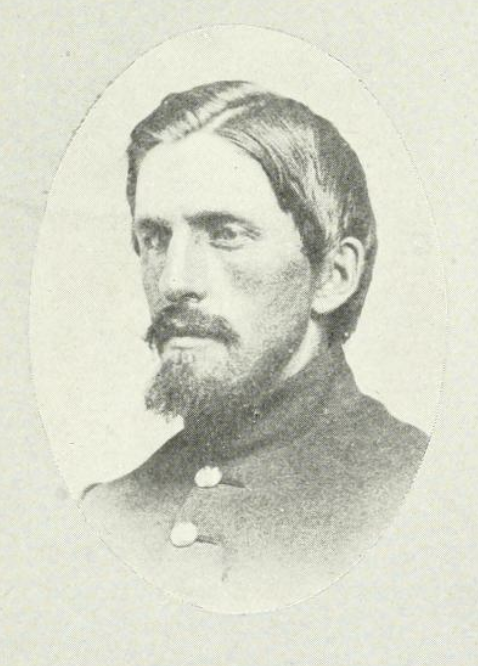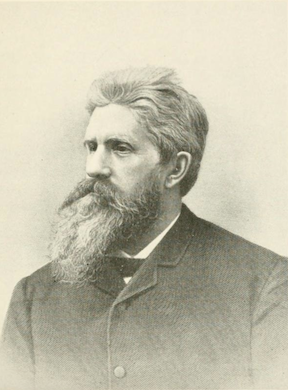Meet Nathaniel Shatswell of the 1st Mass Heavies

One of the things I like most about doing Civil War research is “meeting” a regimental officer I’d not known before. I’ve recently been spending some time with Nathaniel Shatswell of the First Massachusetts Heavy Artillery. Shatswell started with the regiment as a lieutenant in Company A and worked his way up the ladder as an officer.
Let me share with you some accounts from the regimental history, History of the First Regiment of Heavy Artillery, Massachusetts Volunteers by Alfred Seelye Roe and Charles Nutt.
Shatswell, as captain, “showed himself to be one of the best as well as one of the bravest officers in the regiment, was promoted to major, then to lieutenant colonel and to the command of the regiment, and had it not been for another who was on staff duty holding the position of colonel, he would have held that position and would, in the opinion of those familiar with conditions at that time, have advanced still further.”
On January 1, 1863, on “a bitter cold windy day” after “a five days’ passage in the roughest kind of weather,” 250 new recruits joined the regiment in Washington, D.C. Shatswell “rode over from Arlington Heights and led us to the various forts. As the men had enlisted in the various companies they were marched in company squads and left at the proper designations.” All in a winter day’s work for a hardy New Englander.
On January 15, 1863, Shatswell was placed in command of Fort Tillinghast, a lunette about 6-tenths of a mile from Robert E. Lee’s Arlington House, and elected the regiment’s vice treasurer.
On July 18, Shatswell became “the magistrate to try all cases.”
I first met Shatswell on the fields of Spotsylvania at the May 19, 1864 battle of Harris farm: “On our side, Maj. Shatswell was the hero of the day. Wounded in the head early in the fight, he was ordered to the rear by the surgeons and he went, but as soon as his wound was bandaged, he returned to his command, commanding the regiment after Rolfe fell in the first volley. Shatswell was an inspiration. Tall and grand, with a voice like the roar of a lion, hatless, blood trickling from beneath the bandage down his cheek till his coat was saturated with it; he won the undying admiration of his men and unperishable glory for himself and his regiment.”
In late July 1864, “At Deep Bottom, Col. Shatswell dismounted and led us in a skirmish under heavy fire. He did look brave and noble. He was so tall that I could see him above the heads of the men and I never felt so proud of a man as I did of him. He was a good officer and he stuck by us through thick and thin. Every drop of his blood was loyal. One hot dusty day he sent me into my tent to get rested. He always had an eye out for the welfare of his men.”
“At the Grand Army Encampment in Detroit in August, 1891 . . . Col. Shatswell rode at the head of his old command in the parade.”
“Col. Shatswell was devoted to the interests of the regiment after the war and never missed a reunion, when he could possibly attend. He made a rousing speech at Lawrence, Feb. 4, 1885, at a memorable reunion. . . . A ball was given in the evening in the City Hall, in honor of the regiment. From the beginning of the organization until he died. Col. Shatswell spoke at every reunion that he attended, and his speeches were always charged with feeling, patriotism and sterling common sense. He was absent for the first time in 1890, and greetings were sent to him by vote of the association. In 1892 he was again absent. . . .
“Little Miss Ober, daughter of Mr. and Mrs. John H. Ober and granddaughter of Col. Shatswell, was present at the 1891 reunion and was made granddaughter of the regiment.”
On May 19, 1901—the anniversary of the regiment’s first battle—veterans assembled at Harris Farm on the Spotsylvania battlefield to dedicate a monument marking their service in the fight. “The honor of unveiling was given to Colonel Shatswell.”
Shatswell died on Dec. 14, 1905, in Ipswich, Massachusetts. “At the time of his death, the association recorded its appreciation of Col. Shatswell’s character and services, and expressed the feeling of sorrow and bereavement shared by every man in his old command.”
Here’s his full bio from the regimental history:

Nathaniel Shatswell: As commander of the regiment from the time it received its baptism of fire to the end of the war, he led it in every battle and shared in its suffering and hardships; he was its fighting colonel and by virtue of his service as well as his calm courage, character and example, fairly won the foremost place in the confidence, love and esteem of the men who served under him.
He was born at Ipswich, Nov. 26, 1834, son of John and Anne (Lord) Shatswell, grandson of Moses and Sarah (Lord) Shatswell. His father was captain of an Ipswich troop of cavalry in the state militia. His great-grandfather served with distinction in the Revolution. Both his paternal and maternal ancestry is traced to the settlement of Ipswich. He attended the old Pudding Street School and the Latin Grammar School of Ipswich. He assisted his father on the old Shatswell homestead on High Street until the spring of 1855, when he went to East Boston where he worked for two years in a planing mill. There he joined the Boston Fusiliers, continuing in the company until the war broke out, though he returned to Ipswich in the spring of 1857. From that time to the end of his life he made his home on the Shatswell farm and excepting when away in the civil and military service, followed farming there.
From the time he entered the service as captain of Company A, of this regiment, he was indefatigable in performing his duties and fairly won his promotion. On the fatal nineteenth of May, he was second in command, and when Major Rolfe was killed the command devolved upon Major Shatswell, the senior officer. During that battle he was severely wounded in the head by a minie ball and partly stunned. He was taken to the rear and the wound was dressed. Recovering consciousness he returned to the command of his regiment and remained until the retreat of the Rebels at dark gave him an opportunity for rest. During the fight June 16, his sword was shot away from his side. Two days later he was again struck by a minie ball in the side and thrown to the ground. But he quickly remounted his horse and continued to lead his men. A small book filled with papers and orders had saved his life, the bullet lodging in the cover of the book against his side. He had a narrow escape from capture, June 22, when he was surrounded by the enemy and remained concealed in the thicket from nine in the morning until after dark when he succeeded in rejoining his regiment. At the Battle of Boyd ton Road, Col. Shatswell performed one of the most difficult tactical movements successfully, changing front in line of battle while under fire. At Cold Harbor his favorite horse was killed by a Rebel shell, but fortunately the colonel was not in the saddle.
In January, 1865, he was obliged to take a leave of absence on account of illness, returning to his command March 5, 1865. Though he received his commissions as lieutenant colonel and colonel, he was not mustered into service, and remained with the rank of major, in command of the regiment until mustered out. Every man in his command regretted what they felt was lack of appreciation of his gallant service. This feeling finds expression in various contributions to this book. He had the honor of leading the regiment in the Grand Review in Washington.
Col. Shatswell was over six feet in height, of soldierly bearing, having a powerful voice and a strong personality. He was a natural leader, a discreet, brave and kindly officer. He was considerate of his men, tempering discipline with humanity and common sense, taking his share in privations and dangers. He appeared as calm under fire as on dress parade. Mention is made elsewhere of his devotion to his comrades after the war, his love for the regiment and his activity in the Regimental Association.
Returning to his farm after he was mustered out with the regiment, he tilled the soil, was in the teaming business and dealer in hay, etc. In April, 1869, he was appointed assistant superintendent of the county insane asylum and held that office until it was abolished, many years later. Afterward he was assistant master of the Essex County House of Correction. In town affairs he became a leader. He was chief of engineers, constable, chief-of-police, for many years a selectman and during his last term was chairman of the board. At that time the selectmen were also the overseers of the poor and assessors. During his later years he was curator of the Agricultural Building at Washington, D. C, until a few years before he died.
He was a member of General James Appleton Post, G. A. R. ; of John T. Heard Lodge, Free Masons, of which he was Worshipful Master for five years; of Washington Chapter, Royal Arch Masons, and Winslow Lewis Commandery, Knights Templar, of Salem.
As a town and country officer in civil life he displayed the same sterling qualities that distinguished him in the military service. An able executive, upright and honorable, efficient, courageous and conscientious in the discharge of every duty. Col. Shatswell was an exemplary public officer. In private life he was quiet and unassuming, social by nature, making many friends, generous in helping others. No wonder he was beloved and honored by his comrades in arms. He married June 15, 1861, Mary White Stone and had two daughters, Fannie W. and Annie L. He married, second, Sept. 3, 1899, Mrs. Susan Hobbs.
Wonderful story! My husband and I own (and live in) the Shatswell House in Ipswich, where Colonel Shatswell grew up, and where he lived after the Civil War. Thought you might be interested in our house, and our discoveries about its history. https://LAinIpswich.wordpress.com
I am the great granddaughter of Nathaniel Shatswell. My mother was the daughter of Annis (correct spelling) Lord Shastswell (later Holbrook), daughter of Nathaniel. My two sisters and I, plus two cousins are the only descendants in this line. None of us carries the Shatswell name since Nathaniel had no sons. I would like to connect with L.A. in Ipswich who lives in the Shatswell house.